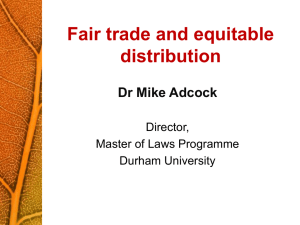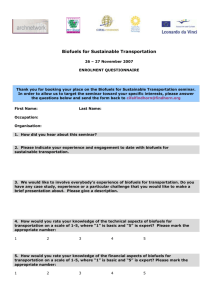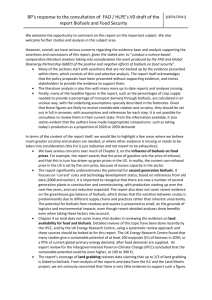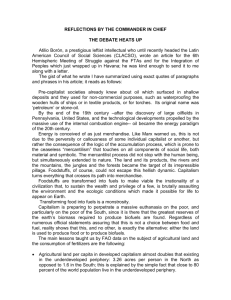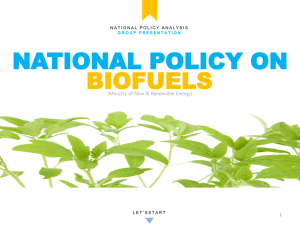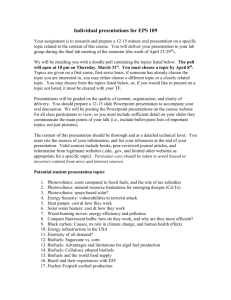Biofuels: silver bullet or red herring?
advertisement
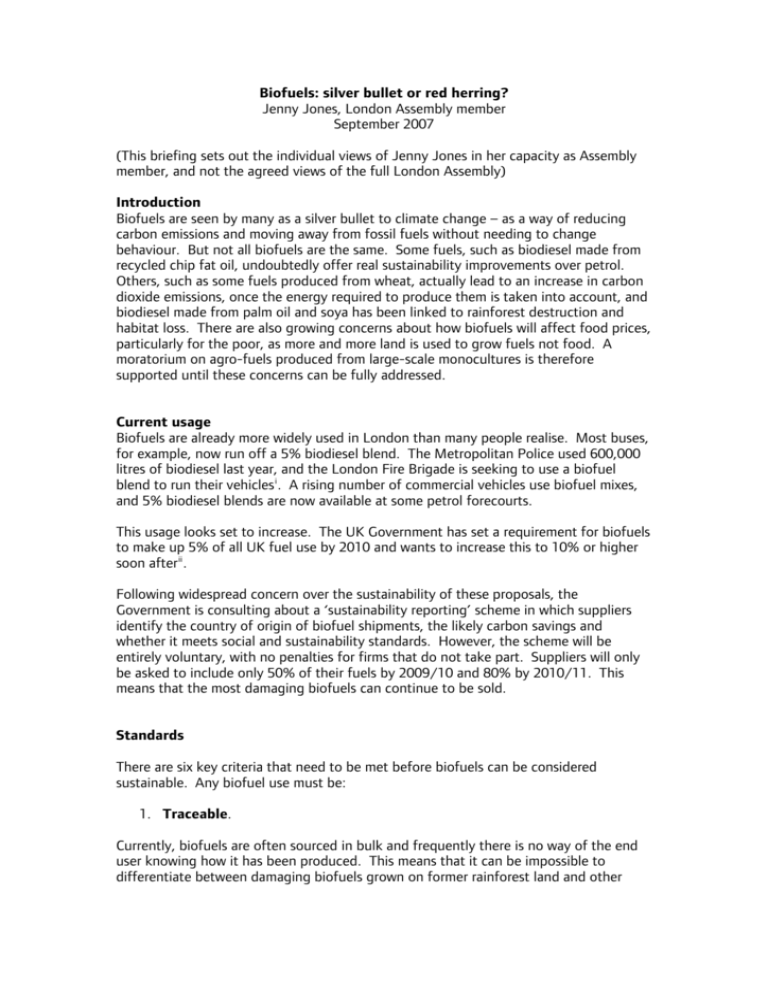
Biofuels: silver bullet or red herring? Jenny Jones, London Assembly member September 2007 (This briefing sets out the individual views of Jenny Jones in her capacity as Assembly member, and not the agreed views of the full London Assembly) Introduction Biofuels are seen by many as a silver bullet to climate change – as a way of reducing carbon emissions and moving away from fossil fuels without needing to change behaviour. But not all biofuels are the same. Some fuels, such as biodiesel made from recycled chip fat oil, undoubtedly offer real sustainability improvements over petrol. Others, such as some fuels produced from wheat, actually lead to an increase in carbon dioxide emissions, once the energy required to produce them is taken into account, and biodiesel made from palm oil and soya has been linked to rainforest destruction and habitat loss. There are also growing concerns about how biofuels will affect food prices, particularly for the poor, as more and more land is used to grow fuels not food. A moratorium on agro-fuels produced from large-scale monocultures is therefore supported until these concerns can be fully addressed. Current usage Biofuels are already more widely used in London than many people realise. Most buses, for example, now run off a 5% biodiesel blend. The Metropolitan Police used 600,000 litres of biodiesel last year, and the London Fire Brigade is seeking to use a biofuel blend to run their vehicles i . A rising number of commercial vehicles use biofuel mixes, and 5% biodiesel blends are now available at some petrol forecourts. This usage looks set to increase. The UK Government has set a requirement for biofuels to make up 5% of all UK fuel use by 2010 and wants to increase this to 10% or higher soon after ii . Following widespread concern over the sustainability of these proposals, the Government is consulting about a ‘sustainability reporting’ scheme in which suppliers identify the country of origin of biofuel shipments, the likely carbon savings and whether it meets social and sustainability standards. However, the scheme will be entirely voluntary, with no penalties for firms that do not take part. Suppliers will only be asked to include only 50% of their fuels by 2009/10 and 80% by 2010/11. This means that the most damaging biofuels can continue to be sold. Standards There are six key criteria that need to be met before biofuels can be considered sustainable. Any biofuel use must be: 1. Traceable. Currently, biofuels are often sourced in bulk and frequently there is no way of the end user knowing how it has been produced. This means that it can be impossible to differentiate between damaging biofuels grown on former rainforest land and other fuels produced more sustainably. A precautionary principle would suggest that biofuels should not be used unless they are known to be from sustainable sources. 2. Low carbon. Biofuels are often billed as ‘zero carbon’ because emissions from burning biofuels are absorbed by the next round of crops. However, once the energy used to produce the crops is taken into account, many biofuels are far from zero carbon. Some biofuels, such as bioethanol produced from wheat, can actually produce up to 8% higher carbon dioxide emissions than petroleum, although this varies according to methods of production iii . Others, such as ‘second generation’ biofuels distilled from wood or crop waste, can achieve CO2 reductions of up to 90% iv , but are not yet in commercial production. When forests are cleared to make may for biofuel crops such as soya or palm oil, the climate change costs are even higher. When a full ‘lifecycle’ analysis is undertaken, palm oil grown on rainforest land is as much as eight times more damaging to the climate than conventional fossil fuels v . In order to ensure that any biofuel use actually leads to carbon reductions instead of exacerbating climate change, TfL and other public bodies procuring biofuels should insist that they produce verifiable CO2 reductions of at least 50%. This must include land use changes as part of a full lifecycle analysis. 3. Habitat-friendly. Environmental groups are increasingly concerned that biofuels produced from soya, palm oil and sugar cane have been linked with rainforest destruction, leading to habitat loss (including threatening orang-utans with extinction) and rising CO2 emissions vi . This particularly applies to biofuels made from Indonesian and Malaysian palm oil and Brazilian soya. These damaging forms of biofuels already account for a significant part of the UK market and this is expected to grow. 20% of the UK’s current biofuel market is from imported palm oil vii . To ensure that biofuel production is not doing more environmental harm than good, TfL and other public bodies must introduce independent, certifiable measures to guarantee that any biofuels they procure are not sourced from former rainforest land or other important wildlife habitats. 4. Small scale. Biofuel use will always need to remain limited. There is simply not enough land available to replace all current oil use with biofuels. For London to meet even 10% of its current fuel use from biodiesel, an area the size of the whole of Cambridgeshire would be required for rapeseed cultivation. The grain required to fill the petrol tank of a Range Rover with ethanol is sufficient to feed one person for a year viii . Growing demand for biofuels is also beginning to play havoc with global food prices. The price of corn, for example, has doubled in the last year and wheat has increased by 50% ix - largely as a result of increased use of biofuels. Ultimately, there will be conflict over land use, between conflicting demands for land between growing food, biofuel production and environmental conservation. TfL and other public bodies should recognise these constraints and realise that any use of biofuels must remain small scale. 5. Recycled, wherever possible. Instead of using crops, biofuels can also be produced by recycling used cooking oil, or even capturing landfill gases. Priority must be given to recycling used cooking oil and biogas over imports. Currently, 15,000 tonnes of used cooking oil is collected per year, and it is estimated that a further 10,000 could be collected with the appropriate facilities and enforcement. However, London uses 3,261,000 tonnes of fuel per year, which means that in a best case scenario biodiesel from used cooking oil would only be able to provide 0.76% of London’s fuel supply. Recycled biofuels should be promoted, while acknowledging that they are likely to remain a small proportion of overall fuel use. 6. Local, organic, fair trade, and GM free. There is growing recognition of the environmental and social impact of industrialised agriculture. This has led to increasing demand for food that is locally sourced, organically produced, fairly traded and free from genetically modified (GM) organisms. The same considerations that apply to food also apply to biofuels. Many biofuel feedstocks, including maize, wheat and soya, are often produced using industrialised agricultural methods, with intensive use of environmentally-damaging artificial fertilisers, pesticides and GM. As with food, preference must be given to procuring fuels that are sourced locally (to limit ‘fuel miles’), grown using sustainable methods of agriculture, avoid GM and do not rely on exploited labour. Conclusion While some types of biofuels offer significant carbon savings over fossil fuels, biofuels also present real environmental risks, including damage to tropical rainforests and other wildlife habitats and an overall increase in carbon emissions. To counter these risks, rigorous sustainability standards must be developed before biofuel use in London buses and other public vehicles is increased. Specifically, any biofuels used should be traceable, low carbon, habitat-friendly, small scale, recycled where possible and preferably local, organic, fair trade, and GM free. These standards may be challenging, but they are also essential to ensure that biofuels do not cause more environmental harm than good. If these criteria cannot be met, it may ultimately be preferable not to use biofuels at all. i http://mqt.london.gov.uk/mqt/question.do?id=16955 See Department for Transport http://www.dft.gov.uk/pgr/roads/environment/rtfo/ iii RSPB. 2006. ‘Bioenergy – Fuel for the future?’ http://www.rspb.org.uk/ourwork/policy/bioenergy/climatechange.asp. iv Mayor of London. 2007. Action Today to Protect Tomorrow: the Mayor’s Climate Change Action Plan. v ‘Costing the Earth’, BBC Radio 4, 18 May 2007. vi E.g. see: http://www.greenpeace.org.uk/media/press-releases/green-fuels-could-be-bad-for-theplanet-say-environmental-and-development-groups vii ‘Costing the Earth’, BBC Radio 4, 18 May 2007. viii McNeely, Jeffrey. 2006. ‘Biofuels – Green energy or grim reaper’? http://news.bbc.co.uk/1/hi/sci/tech/5369284.stm ix http://www.guardian.co.uk/environment/2007/aug/29/food.g2 ii

